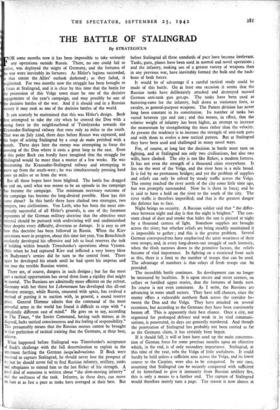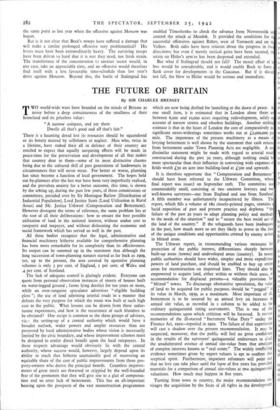THE BATTLE OF STALINGRAD
By STRATEGICUS
OR some months now it has been impossible to take seriously any operations outside Russia. There, no one could fail to ealise, was deployed the might of Germany, and the fortunes of e war were inevitably its fortunes. As Hitler's legions succeeded, that extent the Allies' outlook darkened ; as they failed, it lightened. For two months now the struggle has been brought to focus at Stalingrad, and it is clear by this time that the battle for he possession of this Volga town must be one of the decisive ngagements of the year's campaign, and may possibly be one of he decisive battles of the war. And if it should end in a Russian ictory it may rank as one of the decisive battles of the world.
It can scarcely be maintained that this was Hitler's design. Bock rst attempted to take the city when he crossed the Don with a trong force in the neighbourhood of Tsimlyanska towards the rasnodar-Stalingrad railway that runs only 20 miles to the south. at was on July 22nd, three days before Rostov was captured, and he hope of seizing Stalingrad by a coup de main perished with a eath. Three days later the enemy was attempting to force the rossing of the Don where it casts a great loop to the east. Even t this point Bock can hardly have imagined that the struggle for talingrad would be more than a matter of a few weeks. He was reatening the Krasnodar-Stalingrad railway and attempting to ove up from the south-west ; he was simultaneously pressing hard ome so miles or so from the west.
But all these hopes have been blighted. The battle has dragged n and on, until what was meant to be an episode in the campaign as become the campaign. The minimum necessary outcome of he campaign has become the long-desired possible. How has this come about? In this battle there have clashed two strategies, two tempers, two civilisations. Von Leeb, who has been the most con- sistently successful of all Hitler's generals, is one of the foremost exponents of the German military doctrine that the objective once selected should be pursued with undeviating will and undiminished force despite every difficulty, diversion or damage. It is easy to see how this doctrine has been followed in Russia. When the Kiev operations were in progress, about this time last year, Von Brauchitsch resolutely developed his offensive and left to local reserves the task of holding within bounds Timoshenko's operations about Vyasma. Only when he had captured Kiev and inflicted a very heavy blow on Budyenny's armies did he turn to the central front. There again he developed his attack until he had spent his Impetus and run into the terrible Russian winter.
There are, of course, dangers in such designs ; but for the most part a tactical opportunism has saved them from a rigidity that might be mortal. The Russians are admittedly more efficient on the retreat. Germany with her thirst for Lebensraum has developed this all-out offensive strategy, while Russia, saturated with space, has evolved a method of putting it to auction with, in general, a sound reserve price. General Dietmar admits that the command of the most powerful army in the world has found it difficult to cope with " a completely different cast of mind." He goes on to say, according to The Times, "the Soviet Command, having such masses at its disposal, lacks tactical consciousness and the feeling of responsibility." This presumably means that the Russian masses cannot be brought to that perfection of tactical training that the Germans, at their best, achieve.
What happened before Stalingrad was Timoshenko's acceptance of Bock's challenge with the full determination to exploit to the uttermost farthing the German jusqu'auboutisme. If Bock were resolved to capture Stalingrad, he should never lose the prospect of it ; but he should never fail to find Russian infantry, artillery, tanks and aeltoplanes to extend him to the last flicker of his strength. A good deal of nonsense is written about " the slow-moving infantry " and the swiftness of the tank. Infantry, in these days, can move on foot at as fast a pace as tanks have averaged at their best. But
before Stalingrad all these standards of pace have become irrelevant Tanks, guns, planes have been used in normal and novel operations ; and the infantry, making use of a greater variety of weapons than in any previous war, have inevitably formed the bulk and the back- bone of both forces.
It would be of advantage if a careful tactical study could be made of this battle. On at least one occasion it seems that the Russian tanks have deliberately attacked and destroyed massed German anti-tank gun groaps. The tanks have been used as battering-rams for the infantry, hull down as stationary forts, as cavalry, as general-purpose weapons. The Panzer division has never long been constant in its constitution. Its number of tanks has varied between 35o and 200 ; and this means, in effect, that the relative weight of infantry has been higher, an attempt to increase the momentum by strengthening the mass rather than the velocity. At present the tendency is to increase the strength of anti-tank guns and with them to evolve a new tactical pattern. But at Stalingrad they have been used and challenged in many novel ways.
For, of course, at long last the decision in battle must turn on fighting, and at Stalingrad not only two civilisations, but also two wills, have clashed. The city is not like Rzhev, a modern fortress. It has not even the strength of a thousand cities everywhere. It lies on the west of the Volga, and the river here is a mile broad. It is fed by no permanent bridges; and yet the problem of supplies and reliefs can only be solved by steady traffic across the Volga. The enemy reached the river north of the city some little time ago, but was promptly surrounded. Now he is there in force; and he is said to have a hold on the river to the south of the city. The river traffic is therefore imperilled; and that is the greatest danger the defence has to face.
Night brings no security. A Russian soldier said that " the differ- ence between night and day is that the night is brighter." The con- stant cloud of dust and smoke that hides the sun is pierced at night by a thousand centres of light. Somehow supplies are brought across the river; but whether reliefs are being steadily maintained it is impossible to gather ; and this is the greater problem. Several German correspondents have emphasised tla, utter weariness of their own troops; and, in every long-drawn-out struggle of such intensity, when the Clash narrows down to the primitive factors, the reliefs become of vital importance. In fighting on a restricted front such as this, there is a limit to the number of troops that can be used. The advantage of numbers is that relays of fresh troops can be provided.
The incredible battle continues. Its development can no longer be measured by localities. It is upon streets and street corners, on cellars or fortified upper stories, that the fortunes of battle turn. Its course is not even consistent. As I write, the Russians are advancing in some small sectors. They have still chances, since the enemy offers a vulnerable northern flank across the corridor be- tween the Don and the Volga. They have attacked on several occasions, but according to the Germans they have been consistently beaten off. This is apparently their best chance. Once a city, not organised for prolonged defence and weak in its vital communi- cations, is penetrated, its days are generally numbered. And though the penetration of Stalingrad has probably not been carried as far as the Germans claim, it has certainly been begun.
If it should fall, it will at least have used up the main concentra- tion of German force for some precious months upon an objective which, in the end, is of only secondary importance. Stalingrad, at this time of the year, robs the Volga of little usefulness. It could hardly be held unless a sufficient area across the Volga, and its lower course to the Caspian, were also to be conquered. In any case, assuming that Stalingrad can be securely conquered with sufficient of its hinterland to give it immunity from Russian artillery fire, this is only a means to a further end. The capture of Stalingrad would therefore merely turn a page. The season is now almost at the same point as last year when the offensive against Moscow was begun.
But is it not clear that Bock's troops have suffered a damage that will make a similar prolonged offensive very problematical? His losses must have been extraordinarily heavy. The surviving troops have been driven so hard that it is rest they need, not fresh strain. The transference of the concentration to another sector would, in any case, take an appreciable time, and an offensive would therefore find itself with a less favourable time-schedule than last year's drive against Moscow. Beyond this, the battle of Stalingrad has enabled Timoshenko to check the advance from Novorossisk control the attack at Mozdok. It provided the conditions for th successful offensives against Rzhev, west of Voronezh and on the Volkov. Both sides have been reticent about the progress in the directions; but even if merely tactical gains have been secured, th, strain on Hitler's armies has been deepened and extended.
But what if Stalingrad should not fall? The moral effect of i boss would' be considerable, and it would enable Bock to form flank cover for developments in the Caucasus. But if it should not fall, the blow to Hitler would be serious and immediate.



























 Previous page
Previous page